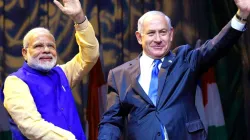PM Modi speaks to Israel's Netanyahu, stresses on need for de-escalation of situation in West Asia
Prime Minister Narendra Modi, in his conversation with Israeli counterpart Benjamin Netanyahu, made a push for the de-escalation of situation in West Asia where the situation remains tensed between Israel and Iran.

Prime Minister Narendra Modi on Friday (August 16) spoke to Israeli counterpart Benjamin Netanyahu and discussed the ongoing situation in the West Asia, the PMO said. PM Modi emphasised the need for "de-escalating the situation" and reiterated India's push for the release of hostages and continued humanitarian aid, the Prime Minister's Office said.
"PM Netanyahu conveyed his warm wishes on India’s 78th Independence Day. The two leaders discussed the prevailing situation in West Asia. PM Modi emphasizes the need for de-escalating the situation and reiterates India’s call for release of hostages, ceasefire and continued humanitarian aid," the PMO said.
The latest discussion on the West Asia between the two leaders comes as tensions are brewing between Israel and Iran after the killing of Hamas chief Ismail Haniyeh in Tehran last month. Iran had vowed to avenge the killing of the Hamas leader stating that it will be “severe and at an appropriate time, place and manner”.
Tensions in the Middle East
Both Iran and Hamas have accused Israel of carrying out the strike killing Haniyeh, hours after he attended the inauguration of Iran’s new president. However, Israel has neither accepted nor denied its responsibility behind the attack.
Tensions have also soared on the northern border of Israel where Hezbollah, a militant group in Lebanon, on Tuesday said it launched a series of strikes against sensitive Israeli military sites, claiming that one of its missiles hit a group of Israeli troops near a site, moments after Hamas' M90 rocket attack on Tel Aviv failed to make an impact.
Hezbollah said its operations were conducted in support of the “steadfast Palestinian people in the Gaza Strip and in support of their brave and honourable resistance” and that one of its missile attacks hit a group of Israeli troops around an Israeli military site near the settlement of Matat. This came after Hamas launched two M90 rockets from Gaza towards Tel Aviv, one of which fell in the sea and the other failed to reach Israeli territory.
Iran's anticipated attack on Israel
Meanwhile, Iran has vowed a severe response to Hamas chief Ismail Haniyeh's killing, which took place as he visited Tehran late last month and which it blamed on Israel. Three Iranian officials told Reuters that only a ceasefire deal in Gaza stemming from hoped-for talks this week would hold Iran back from direct retaliation.
One of the sources, a senior Iranian security official, said Iran, along with allies such as Hezbollah, would launch a direct attack if the Gaza talks fail or it perceives Israel is dragging out negotiations. The sources did not say how long Iran would allow for talks to progress before responding. Iran has been involved in intense dialogue with Western countries and the United States in recent days on ways to calibrate retaliation, the sources said.